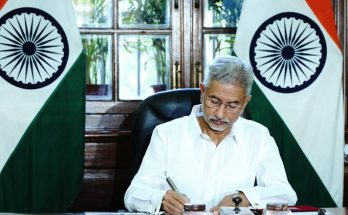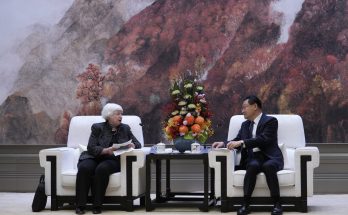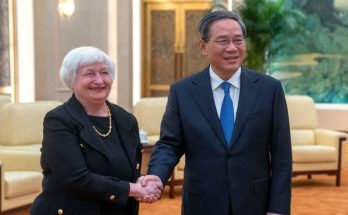 Against the backdrop of the Indian Ocean turning into a theatre of geopolitical competition and increased Chinese forays into this strategic water body, the 21 littoral nations whose shores are washed by this strategically located resource-rich body will hold its first ever summit of leaders in the Indonesian capital Jakarta on March 7.
Against the backdrop of the Indian Ocean turning into a theatre of geopolitical competition and increased Chinese forays into this strategic water body, the 21 littoral nations whose shores are washed by this strategically located resource-rich body will hold its first ever summit of leaders in the Indonesian capital Jakarta on March 7.
India, a preeminent Indian Ocean power, has high stakes in moulding the outcomes of the maiden summit of the Indian Ocean Rim Association. The first IORA summit is special as it also marks the 20th anniversary of the grouping of the Indian Ocean littoral states. Ideally, Prime Minister Narendra Modi, who has been trying to shape a strategic and cooperative vision of the Indian Ocean Region, should be participating in the summit, but the crucial elections in India’s largest state Uttar Pradesh has kept him away from this important gathering of leaders of the region. Vice-President Hamid Ansari, a veteran diplomat, is expected to unveil India’s agenda and priorities at the summit in Jakarta on March 7.
Bolstering IORA
 The overarching priority of the IORA summit will be to reinvigorate the 21-nation grouping which has punched below its weight and has underperformed in the last two decades. The substantive outcomes firmed up at the meeting of senior officials and ministers, which include IORA Concord, IORA Action Plan, IORA Declaration on Preventing and Countering Terrorism and Violent Extremism, and the Joint Declaration of the IORA business Community to Build Partnership for a Sustainable and Equitable Economic Growth, should hopefully help turn around the narrative of IORA and position it as a viable and effective regional forum amid unfolding geopolitical games. “The progress in cooperation among IORA nations has not been impressive all these years. The focus should be on strengthening the grouping. There is great potential for enhancing trade, investment and development among IORA countries,” Dr Baladas Ghoshal, director, Society for Indian Ocean Studies, told India Writes Network.
The overarching priority of the IORA summit will be to reinvigorate the 21-nation grouping which has punched below its weight and has underperformed in the last two decades. The substantive outcomes firmed up at the meeting of senior officials and ministers, which include IORA Concord, IORA Action Plan, IORA Declaration on Preventing and Countering Terrorism and Violent Extremism, and the Joint Declaration of the IORA business Community to Build Partnership for a Sustainable and Equitable Economic Growth, should hopefully help turn around the narrative of IORA and position it as a viable and effective regional forum amid unfolding geopolitical games. “The progress in cooperation among IORA nations has not been impressive all these years. The focus should be on strengthening the grouping. There is great potential for enhancing trade, investment and development among IORA countries,” Dr Baladas Ghoshal, director, Society for Indian Ocean Studies, told India Writes Network.
In his speech at the summit, Mr Ansari is expected to dwell at length on huge potential and opportunities for cooperation across the spectrum, including scaling up maritime trade and investment, bolstering connectivity, and upholding freedom of navigation. These are also shared priorities of the IORA nations, and should be reflected in a concrete roadmap that will emanate from the March 7 summit.
Blue Economy
 In scaling up intra-IORA economic cooperation, the littoral nations are expected to prioritize the role of the private sector and forging Private-Public Partnerships (PPA) to enhance trade and investment. Blue will be the reigning colour at the IORA leaders’ discussions in Jakarta. If all goes well, the summit should come out with a joint plan for the development of the blue economy which entails sustainable development of ocean resources by avoiding debilitating resource competition. Prime Minister Modi is an ardent proponent of the blue economy, a concept he has vigorously expounded during his three-nation tour to Mauritius, Seychelles and Sri Lanka in March 2015 and later at the India-Africa Forum Summit-III in October 2015. The Blue Economy is an idea whose time has come, and the summit’s concord will reflect this new frontier area in multilateral diplomacy and economic cooperation.
In scaling up intra-IORA economic cooperation, the littoral nations are expected to prioritize the role of the private sector and forging Private-Public Partnerships (PPA) to enhance trade and investment. Blue will be the reigning colour at the IORA leaders’ discussions in Jakarta. If all goes well, the summit should come out with a joint plan for the development of the blue economy which entails sustainable development of ocean resources by avoiding debilitating resource competition. Prime Minister Modi is an ardent proponent of the blue economy, a concept he has vigorously expounded during his three-nation tour to Mauritius, Seychelles and Sri Lanka in March 2015 and later at the India-Africa Forum Summit-III in October 2015. The Blue Economy is an idea whose time has come, and the summit’s concord will reflect this new frontier area in multilateral diplomacy and economic cooperation.
China Challenge
The increasing strategic salience of the Indian Ocean can’t be overemphasised. China will be the elephant in the room when the leaders of IORA nations meet in Jakarta as most of them have some form of China anxiety. The recent visit by Chinese submarines to Sri Lanka and Bangladesh, and Beijing’s string of pearls project of building ports in the Indian Ocean neighbourhood, has exacerbated anxieties in New Delhi. There is a temptation here to get into China containment games, but that does not seem to be a practical proposition as most of IORA countries have extensive economic relations with Asia’s largest economy and a potential hegemon. India should play its cards well by deepening relations with major players in IORA including Indonesia, Australia and South Africa, and raising the profile of the IORA so that it emerges as a viable balancing force against the growing Chinese assertiveness in the region without getting into overt containment games.
Author Profile

- Manish Chand is Founder-CEO and Editor-in-Chief of India Writes Network (www.indiawrites.org) and India and World, a pioneering magazine focused on international affairs. He is CEO/Director of TGII Media Private Limited, an India-based media, publishing, research and consultancy company.
Latest entries
 India and the WorldJuly 9, 2024Defying West, India sets $100 billion trade target with Russia
India and the WorldJuly 9, 2024Defying West, India sets $100 billion trade target with Russia India and the WorldJuly 5, 2024India at SCO: Takes swipe at Pakistan for cross-border terror, pushes alternative to BRI
India and the WorldJuly 5, 2024India at SCO: Takes swipe at Pakistan for cross-border terror, pushes alternative to BRI India and the WorldJune 14, 2024Modi’s Day 1 in Italy: Bonding with Britain, France
India and the WorldJune 14, 2024Modi’s Day 1 in Italy: Bonding with Britain, France India and the WorldJune 13, 2024G7 summit in Italy: Modi to showcase India as leader of Global South
India and the WorldJune 13, 2024G7 summit in Italy: Modi to showcase India as leader of Global South






